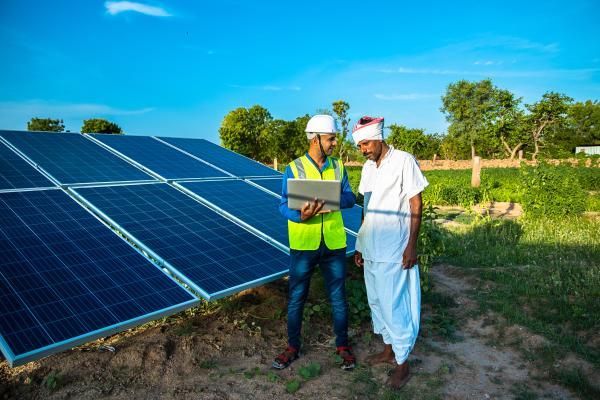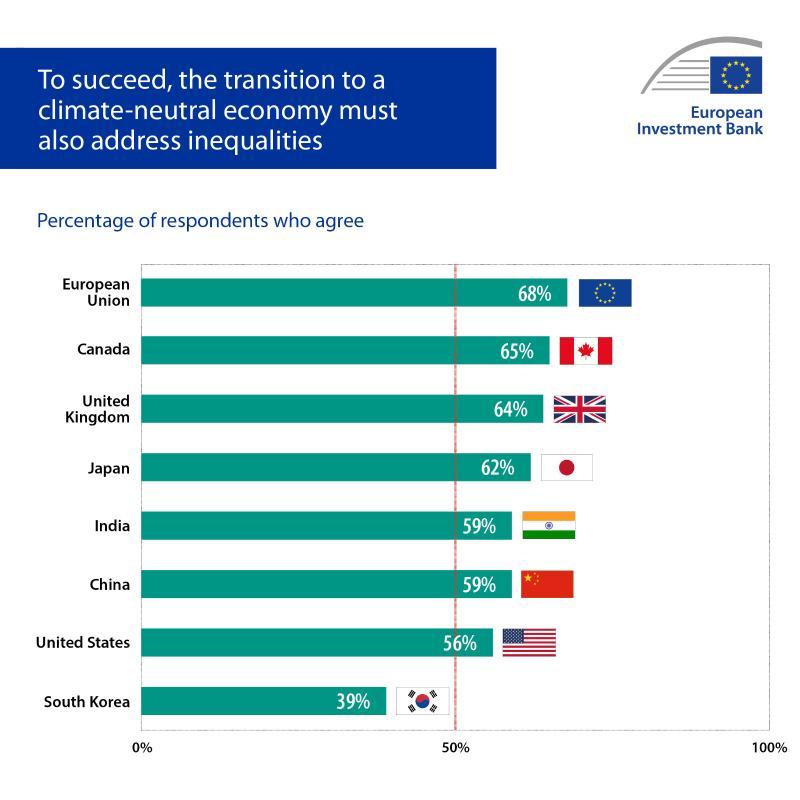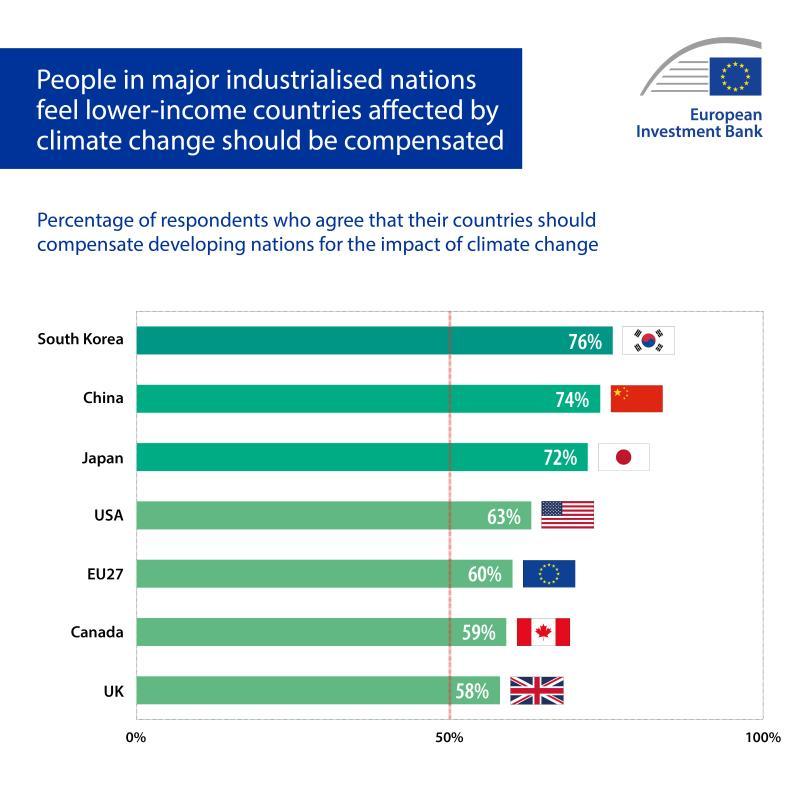
- Most respondents say that the transition to a carbon-neutral global economy can only succeed if it also addresses inequalities (European Union: 68%; United States: 56%; China: 59%; India: 59%; and Japan: 62%).
- The rising cost of living, climate change and environmental concerns, and income inequalities are consistently ranked as the top three challenges. Climate and environmental issues are considered the top challenges in India and China, and the second most significant challenges in the European Union, the United States and Japan.
- There is a noteworthy consensus in favour of eliminating subsidies and tax breaks for the aviation sector and industries that rely heavily on fossil fuels (European Union: 74%; United States: 78%; China: 94%; India: 92%; and Japan: 71%).
- Most respondents from the European Union, the United States, China and Japan believe their countries should compensate developing nations for climate change impacts.
The European Investment Bank (EIB) today launched the sixth edition of its Climate Survey. These are some of the most striking results of this annual survey conducted in August and September 2023. Running since 2018, the EIB Climate Survey offers insights into the climate change-related views of people in major economies around the world, with more than 30 000 respondents in the European Union, the United States, China, India, Japan, the United Kingdom, UAE, Canada and South Korea. The EIB is the lending arm of the European Union and the world’s largest multilateral lender for climate action projects.
Climate change impacts and environmental degradation top the list of perceived challenges in India and China, while they are a close second to the cost of living in the European Union, the United States and Japan.
A clear majority of all respondents except those in Japan believe that measures to combat climate change will improve people’s daily lives, including the quality of food and health (European Union: 61%; United States: 66%; China: 69%; India: 65%; and Japan: 47%).
European and Japanese respondents are split on whether the green transition will create or eliminate jobs (51% and 49%, respectively) while their American, Chinese and Indian counterparts are more optimistic (57%, 70% and 63%, respectively) and believe net additional jobs will be created.
Demand for a just transition at home and in developing countries
Survey respondents recognise that the financial cost of the green transition is likely to affect personal budgets — especially those of lower-income households — and endorse policies that take social and economic inequalities into account to address the climate emergency. Most say that to succeed, the transition to a climate-neutral economy must also address inequalities (European Union: 68%; United States: 56%; China: 59%; India: 59%; and Japan: 62%).

However, some respondents lack confidence in the government’s ability to carry out such a fair transition. Most respondents in the European Union (62%) and Japan (60%) say they are not confident that their governments can address both challenges at the same time, whereas respondents in the United States, China and India are more optimistic, with 57%, 93% and 88% of respondents, respectively, trusting their government with this dual task.
Helping developing countries to deal with the impact of climate change
On the question of compensation to developing countries to help them deal with the impacts of climate change — expected to be a central topic at the 2023 UN Climate Change Conference in Dubai (COP28) —the survey shows that the global demand for fairness extends beyond national borders.
Conscious of a historical responsibility, most respondents from the European Union (60%), the United States (63%), China (74%) and Japan (72%) agree that their countries should financially compensate affected countries to help them fight climate change.

Taxes to support a just transition
Survey results show that most respondents would be willing to pay higher income taxes to help lower-income households cope with the costs of the green transition (European Union: 59%; United States: 67%; China: 90%; India: 89%; and Japan: 58%).
More specifically, 46% of EU respondents said they would agree to pay 1-2% more (United States: 40%; China: 59%; India: 45%; and Japan: 45%), and 13% of EU respondents would agree to pay as much as 5-10% more (United States: 27%; China: 31%; India: 44%; and Japan: 13%).
The vast majority of respondents also said they would be in favour of other kinds of environment-related taxes. For example, 74% of EU respondents said they would favour a fossil fuel tax reform (United States: 78%; China: 94%; India: 92%; and Japan: 71%) to eliminate subsidies and tax breaks for the aviation sector and other industries that rely heavily on fossil fuels.
Comments from EIB Vice-President Ambroise Fayolle, who is responsible for climate action and development at the Bank:
“The latest EIB Climate Survey underlines people’s profound awareness of climate change and their commitment to tackle it head on. They recognise that a successful transition to a climate-neutral world goes hand in hand with addressing social and economic inequalities at home and globally. At the European Investment Bank, we are fully committed to supporting a just transition that leaves no one behind. Solidarity and actionable measures are more important now than ever.”
Comments from Laura Sabogal Reyes, Senior Policy Advisor, E3G Public Banks Programme:
“The insights of the 2023 EIB Climate Survey leave no doubt. The global green transition will not be successful without addressing economic and social inequalities head on. Public Development Banks must play a crucial role in ensuring that the transition to a more sustainable and inclusive future is equitable and just, leaving no one behind."
Background information
About the EIB Climate Survey
The European Investment Bank (EIB) has now completed the sixth annual EIB Climate Survey, a thorough assessment of how people feel about climate change. Conducted in partnership with the market research firm BVA, the sixth edition of the EIB Climate Survey aims to inform the broader debate on attitudes and expectations in terms of climate action. More than 30 000 respondents participated in the survey from 7 August to 4 September 2023, with a representative panel of people aged 15 and above for each of the 35 countries polled (EU 27, the United States, China, the United Kingdom, India, Japan, South Korea, Canada and UAE).
About the European Investment Bank
The European Investment Bank (EIB) is the long-term lending institution of the European Union owned by its Member States. It is active in more than 160 countries and makes long-term finance available for sound investment in order to contribute towards EU policy goals.
- In 2019, the EIB adopted an updated energy lending policy ending financing to any unabated fossil fuel energy projects, including natural gas. The EIB was the first multilateral development bank to do this.
- In 2021, the EIB also became the first multilateral development bank to align its financial activities with the Paris Agreement.
- Through its Climate Bank Roadmap, the EIB Group aims to support €1 trillion of investment in climate action and environmental sustainability through the critical decade 2021-2030.
- It also made a commitment to increase investment in climate action and environmental sustainability to more than 50% of its annual lending by 2025 (last year that goal was exceeded with a figure of 58%).
EIB Global is the EIB Group’s specialised arm dedicated to operations outside the European Union and is a key partner of the EU Global Gateway strategy. It aims to support at least €100 billion of investment by the end of 2027, around one-third of the overall target of the Global Gateway. Within Team Europe, EIB Global fosters strong, focused partnerships alongside fellow development finance institutions and civil society. EIB Global brings the Group closer to local communities, companies and institutions through its offices across the world.
About BVA Xsight
BVA Xsight is a pioneer in market research and consulting. With their sector-specific knowledge and skills, its 400 experts analyse the unique facets of individuals' lives. They provide in-depth and actionable insights, enhancing decision-making and organisational performance.
BVA Xsight operates both in France and internationally, partnering with public and private organisations. Recognised with multiple awards for its innovation capabilities, BVA Xsight stands out for its teams' commitment and passion for the profession.
Founded in France in 1970, BVA Xsight is a mission-driven company and is part of the international BVA Group.
Find out more about BVA Xsight: www.bva.fr